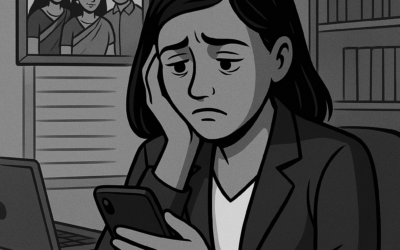It takes effort to put together a resume but more so, to list down your life to achievements, interests and experiences. While listing these down, there’s also a lot of internal loss felt. An attempt to make white out of the rainbow colors (without a prism). And then giving color to the filtered white just so the market out there can compare your filters to others and shortlist who they want. In all this ‘viewing’ of profiles, there’s little ‘seeing’.

Image for representation from Creative Commons
There are few workplaces which do not stick to the standard procedure of glance – put in boxes – eliminate. They put effort in seeing, seeing your effort to show. At Basic Healthcare Services, my fellowship host organization, we take pride in seeing the way we do. Of course it takes an effort to notice what your journey must have been between switching fields and rising grades. In selecting based on effort, going into the file beyond the profile. And then, it’s time for interviews. After all this see-show, you’d expect to have a unique list. But it’s interview day and some candidates do not show up.
In those initial minutes when we wait, we wonder what might have happened. In those few first minutes, the concern is actually about this person. What might have possibly caused the absence after the whole process of applying for a position.
Cold feet? An emergency? A series of mishaps?
Sympathizing with the imagination of this person later narrating to a friend their story of
- ‘How I missed that interview for the job I was so eager for’.
- ‘Everything that could possibly go wrong, successfully went wrong that day’
- ‘The bus needed a tyre change’
- ‘A roadblock caused by an accident’
With this imagination, we make room for the best possible reasons for not showing up. But still, we are left wondering each time this happens. After a point, patience doesn’t come easy and we also begin feeling flustered. Was this job one of the many alternatives for this person? Was this role lower on the preference list and available options to the person? Did the person apply just to see if they ‘had it in them’? Did they just forget, despite the reminder?
We need to work together to make workplaces better and at a larger scale, making the market more humane. For this, we need to communicate. Quite understandably, whatever the reason for not showing up is, it might be embarrassing to communicate those reasons later. Or worse, you probably didn’t bother.
Watch: Your elusive creative genius, a talk by Elizabeth Gilbert that reiterates the value of showing up
We could take a step toward each other and make the whole hiring process warmer. Recruiters could be more mindful about sending across feedback once they decide a candidate isn’t a good match. The candidates are thus not left hanging and they also have something to work on. Job applicants could be more considerate about communicating their reasons for not showing up. And perhaps also be more responsible before choosing to apply.
We often assume that companies and institutions might not have enough time to hear and value what happened at our end. But in assuming so, we reduce ourselves to mere candidates. We forget our personhood. We forget that companies are run by people too.
Your profile does not end with what you wish to show. The traces linger longer. Why not take up space to share your story?




0 Comments